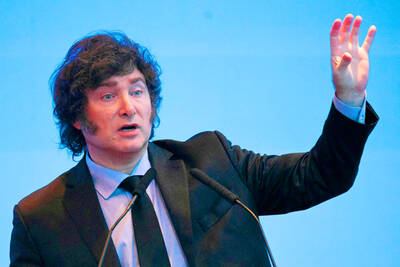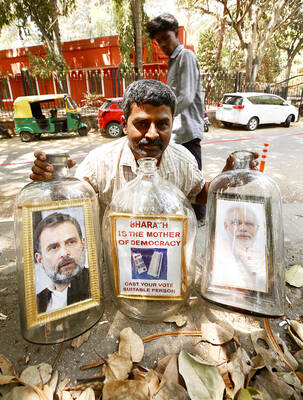COVID-19 support to poor nations has so far been “grossly inadequate and that’s dangerously shortsighted,” UN Undersecretary-General for Humanitarian Affairs and Emergency Relief Coordinator Mark Lowcock said on Thursday, as he asked wealthy nations for billions more dollars in assistance.
The UN increased its humanitarian appeal by more than one-third to US$10.3 billion to help 63 states, mainly in Africa and Latin America, tackle the spread and destabilizing effects of the pandemic.
That was up from the UN’s initial US$2 billion request in March, then US$6.7 billion in May.
So far, Lowcock said, the UN had only received US$1.7 billion.
As G20 finance ministers prepared to meet via videoconference today, Lowcock told reporters: “The message to the G20 is step up now or pay the price later.”
The coronavirus has infected more than 13.8 million people and there have been almost 590,000 known deaths worldwide. The UN has said that if action is not taken, the pandemic and associated global recession would trigger an increase in global poverty for the first time since 1990 and push 265 million people to the brink of starvation.
“The response so far of wealthy nations, who’ve rightly thrown out the fiscal and monetary rule books to protect their own people and economies, the response that they’ve made to the situations in other countries has been grossly inadequate and that’s dangerously shortsighted,” Lowcock said.
Lowcock added that he had lobbied US lawmakers for funding earlier this week.
A US House of Representatives committee has proposed US$10 billion in international aid. So far, US Congress has provided US$2.4 billion in emergency foreign aid.
Chinese President Xi Jinping (習近平) in May pledged US$2 billion to help deal with COVID-19, and economic and social development in affected nations, especially developing states.
Lowcock said that he would “very much welcome it if some significant proportion of those resources could be used directly to support the global humanitarian response plan.”

As the sun sets on another scorching Yangon day, the hot and bothered descend on the Myanmar city’s parks, the coolest place to spend an evening during yet another power blackout. A wave of exceptionally hot weather has blasted Southeast Asia this week, sending the mercury to 45°C and prompting thousands of schools to suspend in-person classes. Even before the chaos and conflict unleashed by the military’s 2021 coup, Myanmar’s creaky and outdated electricity grid struggled to keep fans whirling and air conditioners humming during the hot season. Now, infrastructure attacks and dwindling offshore gas reserves mean those who cannot afford expensive diesel

Does Argentine President Javier Milei communicate with a ghost dog whose death he refuses to accept? Forced to respond to questions about his mental health, the president’s office has lashed out at “disrespectful” speculation. Twice this week, presidential spokesman Manuel Adorni was asked about Milei’s English Mastiff, Conan, said to have died seven years ago. Milei, 53, had Conan cloned, and today is believed to own four copies he refers to as “four-legged children.” Or is it five? In an interview with CNN this month, Milei referred to his five dogs, whose faces and names he had engraved on the presidential baton. Conan,

Le Tuan Binh keeps his Moroccan soldier father’s tombstone at his village home north of Hanoi, a treasured reminder of a man whose community in Vietnam has been largely forgotten. Mzid Ben Ali, or “Mohammed” as Binh calls him, was one of tens of thousands of North Africans who served in the French army as it battled to maintain its colonial rule of Indochina. He fought for France against the Viet Minh independence movement in the 1950s, before leaving the military — as either a defector or a captive — and making a life for himself in Vietnam. “It’s very emotional for me,”

Indian Prime Minister Narendra Modi reaffirmed his pledge to replace India’s religion-based marriage and inheritance laws with a uniform civil code if he returns to office for a third term, a move that some minority groups have opposed. In an interview with the Times of India listing his agenda, Modi said his government would push for making the code a reality. “It is clear that separate laws for communities are detrimental to the health of society,” he said in the interview published yesterday. “We cannot be a nation where one community is progressing with the support of the Constitution while the other